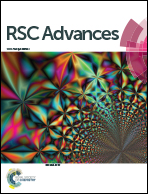Identification of benzochromene derivatives as a highly specific NorA efflux pump inhibitor to mitigate the drug resistant strains of S. aureus†
Abstract
Increased expression of efflux transport proteins confers the Multi Drug Resistant (MDR) phenotype to drug resistant bacteria, which can be mitigated by efflux pump inhibitors (EPI). EPI's have the dual advantage of restoring efficacy of antibiotics and retarding the evolution of drug resistant mutants. In this study, 17 heterocyclic derivatives synthesized by a polyethylenimine (PEI) catalyzed one-pot protocol were evaluated for their EPI potential. Based on in silico studies and in vitro studies, 5 benzochromene (BC) based compounds (among 17 heterocyclic derivatives), were observed to significantly potentiate the effect of ciprofloxacin (CPX) and displayed a best modulation factor of 32, against the NorA overexpressed mutant SA-1199B. Toxicity analyses using the zebrafish model showed that, from all the benzochromene compounds evaluated, BC9 exhibited low toxicity. BC9 inhibited the NorA efflux pump at a minimum effective concentration (MEC) of 2 μg ml−1 (4.03 μM) and even at subinhibitory concentrations, and it was effective in reversing the CPX MIC of both the ATCC strain and a clinical isolate of MRSA by 128 and 4 fold respectively. Our results show that benzochromene derivative BC9 is a highly specific NorA inhibitor that can be employed to mitigate MDR strains of S. aureus that overexpress the NorA efflux pump.



 Please wait while we load your content...
Please wait while we load your content...